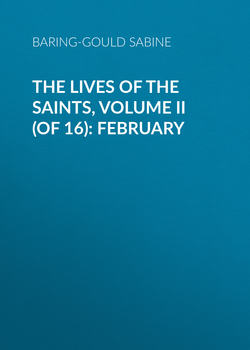The Lives of the Saints, Volume II (of 16): February

Реклама. ООО «ЛитРес», ИНН: 7719571260.
Оглавление
Baring-Gould Sabine. The Lives of the Saints, Volume II (of 16): February
February 1
February 2
February 3
February 4
February 5
February 6
February 7
February 8
February 9
February 10
February 11
February 12
February 13
February 14
February 15
February 16
February 17
February 18
February 19
February 20
February 21
February 22
February 23
February 24
February 25
February 26
February 27
February 28
February 29
Отрывок из книги
THE PURIFICATION is a double feast, partly in memory of the B. Virgin's purification, this being the fortieth day after the birth of her Son, which she observed according to the Law (Leviticus xii. 4), though there was no need for such a ceremony, she having contracted no defilement through her childbearing. Partly also in memory of Our Lord's presentation in the temple, which the Gospel for the day commemorates.
The Old Law commanded, that a woman having conceived by a man, if she brought forth a male child, should remain forty days retired in her house, as unclean; at the end of which she should go to the temple to be purified, and offer a lamb and a turtle dove; but, if she were poor, a pair of turtle doves or pigeons, desiring the priest to pray to God for her. This law the Blessed Virgin accomplished (Luke ii. 12) with the exercise of admirable virtues; especially did she exhibit her obedience, although she knew that she was not obliged to keep the law, yet, inasmuch as her Son had consented to be circumcised, though He needed it not, so did she stoop to fulfil the law, lest she should offend others. She also exhibited her humility, in being willing to be treated as one unclean, and as one that stood in need of being purified, as if she had not been immaculate. Among the Greeks, the festival goes by the name of Hypapante, which denotes the meeting of our Lord by Symeon and Anna, in the temple; in commemoration of which occurrence it was first made a festival in the Church by the emperor Justinian I., a. d. 542. The emperor is said to have instituted it on occasion of an earthquake, which destroyed half the city of Pompeiopolis, and of other calamities. It was considered in the Greek Church as one of the feasts belonging to her Lord (Despotikaì Heortaì). The name of the Purification was given to it in the 9th century by the Roman pontiffs. In the Greek Church the prelude of this festival, which retains its first name, Hypapante, is "My soul doth magnify the Lord, for He hath regarded the lowliness of his hand-maiden;" and a festival of Symeon and Anna is observed on the following day.
.....
But the voyage was most disastrous. The missionaries had not proceeded far when they were attacked by pirates. A fierce battle ensued, and their crew, though first victorious, were overpowered in a second engagement, and barely escaped to land. The pirates plundered them of everything, the presents for the king, their sacred books, and all their ecclesiastical vestments. In this forlorn and destitute condition they reached Birka, a haven and village on the Mälar lake, not far from the ancient capital Sigtuna, the residence of rich merchants, and the centre of the northern trade. Here they were hospitably welcomed by the king, Biorn "of the Hill," and received full permission to preach and baptize. The nucleus of a church was found already existing in the persons of many Christian captives, who had long been deprived of the consolation of Christian ordinances. The work, therefore, of the missionaries commenced under fair auspices, and before long Herigar, the king's counsellor, announced himself a convert, and erected a church on his estate.
A year and a half was thus employed, and then Anskar returned to the court of Louis with a letter from the King of Sweden, and an account of all that had befallen him. Thereupon Louis resolved, without delay, to give effect to the ecclesiastical plans of his father, and to make Hamburg an archiepiscopal see, and the centre of operations for the northern missions. Accordingly, Anskar was elevated to the archiepiscopal dignity, and was consecrated at Ingleheim by Drogo, Archbishop of Mayence, and other prelates. At the same time, because of the poverty of the diocese, and the dangers to which the mission would be inevitably exposed, the monastery of Thourout in Flanders, between Bruges and Ypres, was assigned to him as a place of refuge, and a source of revenue. Then he was directed to repair to Rome, where he received the pall from Gregory IV., and was regularly authorized to preach the Gospel to the nations of the North.
.....